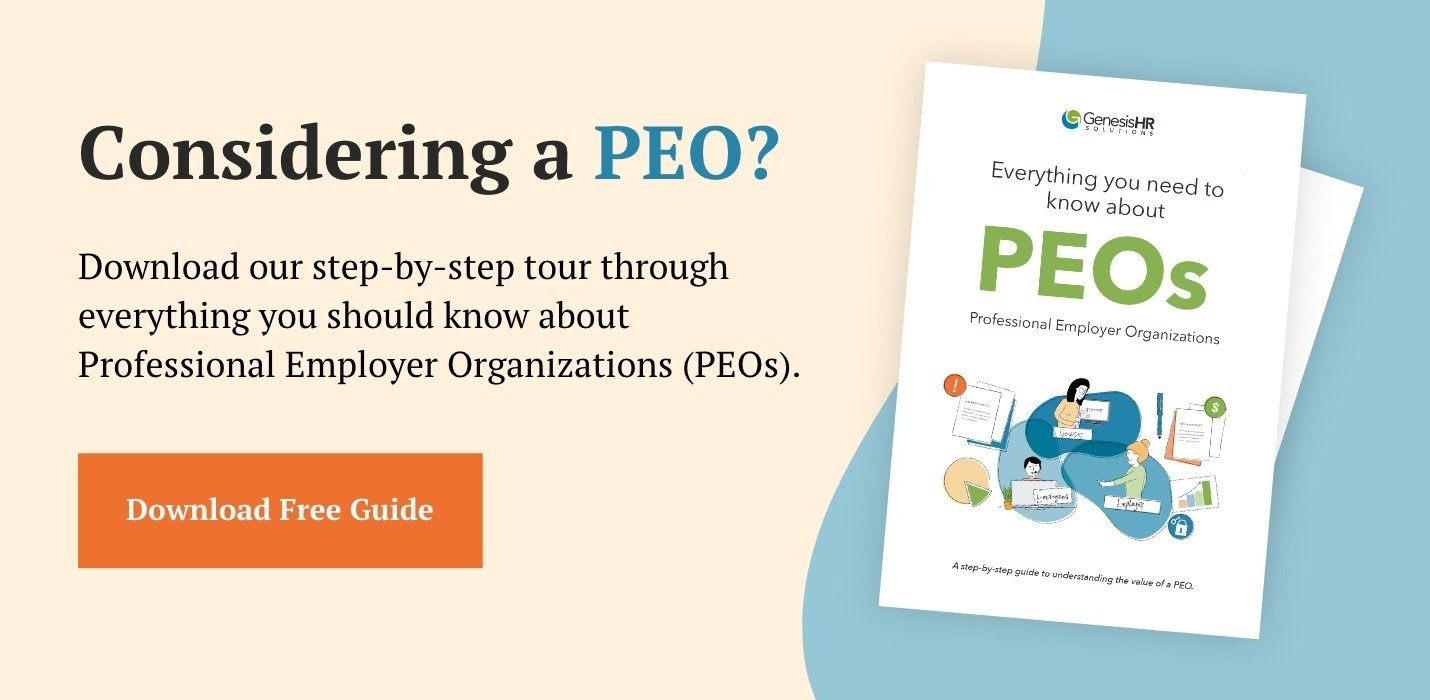If you’re investigating outsourcing your HR needs, you may have run into two different services that seem similar: administrative services organization (ASO) and professional employer organization (PEO). Both offer services to small and mid-size businesses, but there are a few key differences you should know as you evaluate an ASO vs. PEO.
Here are a few key differences you need to know as you make a decision between outsourcing to an ASO vs. PEO. Click To TweetWhat is an ASO?
An administrative service offering (ASO) is a service businesses use to outsource administrative functions, including employee benefits, payroll, HR management, workers compensation, and safety programs. With an ASO, your small business gets one partner that manages the vendors your business selects to work with.
What is a PEO?
A professional employer organization (PEO) allows a business to outsource many of its human resource functions, share employment liability, and, oftentimes, gain economies of scale to bring an improved benefits package to employees. A PEO is an extension of your business and engages with your management team to address complex employee-related matters.
PEO services include administration of the following:
- Employer compliance
- Workplace policies; equal opportunity employment, leaves, accruals, etc.
- Health and welfare benefits and COBRA
- Payroll processing and payroll tax compliance
- Workers’ compensation reporting and claims
It contracts with your business to perform these processes, assume associated responsibilities, and provide ready expertise in human resources management. In a PEO partnership, your PEO selects the vendors you work with—offering best-in-class options to choose from that best fit your company’s needs.
Want to learn more about what a PEO is and why your company needs one?
Download Everything You Need To Know About PEOs!
How are PEOs and ASOs similar?
At first glance, PEOs and ASOs may seem similar:
- Both ASOs and PEOs provide human resource services and expertise that small and midsize businesses may not have.
- Both may give clients access to advanced automation and technology tools.
- Both are external providers, which is considered outsourcing.
But looks can be deceiving! Though the two may look similar, ASOs and PEOs are actually very different, and serve their partner companies in different ways.
ASO vs. PEO: How are they different?
1. ASOs manage the third-party partners you choose; PEOs choose third-party partners and offer them to you.
An ASO requires you to select and manage the vendors you work with, but in a PEO partnership, you don’t have to choose your partners. While it may seem counterintuitive to not choose your own vendors, this is actually a key benefit to partnering with a PEO.
Why? Because PEOs like Genesis live in the insurance world day-in and day-out, whereas most businesses look at insurance only once a year when it comes time to select plans. As you’ve likely experienced when dealing with insurance vendors, the insurance industry uses a different language—and you must know it in order to thoroughly understand and compare the benefits available under different carriers. With an ASO, you select the vendors and plans to offer.
PEOs like Genesis do these comparisons all the time and are fluent in the insurance language. We remove the frustration of choosing between different carriers and different plans by breaking it all down for you. As your PEO, it’s in our best interest to select best-in-class options that offer enough choices to satisfy you and your employees. We understand which benefits are most important to your employees and focus on those things.
2. ASOs don’t get volume pricing for benefits; PEOs do.
With an ASO, you don’t get volume pricing for purchasing benefits like life insurance, as you’re still viewed as being a small employer. Having a PEO select your insurance partners benefits you because your company is viewed as part of a larger group. A PEO takes its entire book of business (all clients in the aggregate) to the insurance market and procures benefits based on the larger group and can then recognize volume pricing.
3. Both options manage insurance partners (but in different ways).
Both ASOs and PEOs take on the burden of managing vendors, but the difference is that an ASO could potentially be managing an insurance carrier for each of its clients, while a PEO has a single carrier and a team. This is a benefit for companies who partner with PEOs; because we’re larger, we get more attention from our vendors, and we receive the right level of service for our clients and their employees. This is specifically helpful when an employee experiences a claims processing issue and the PEO leverages their dedicated service team at the carrier.
4. PEOs have skin in the game when it comes to liability and compliance.
Because a PEO is a co-employer and shares some amount of an employer’s liability, a PEO has a vested interest in being a good employer along with our clients. This means we’re very focused on compliance and mitigating liability, and we have a desire to coach our employers so they have good outcomes in any employment situation.
Conversely, an ASO takes on no employer risk: ASOs are essentially consultants, and they have no exposure when problems occur—which means that while an ASO may desire to have a good outcome for employers, they don’t actually have any skin in the game if an employer ends up in a challenging situation.
At Genesis, we actively advise our clients, coaching managers in things like compliance and effective message delivery. We’re dedicated to helping you do the right thing in a way that doesn’t expose you (or us) to any employment-related litigation.
What do you need from an HR partner?
Identify and list the activities you’re struggling with that you would like to offload. Use that list to see how the solutions you’re considering line up with your needs. This is the most important part of finding a partner. When you’ve made a decision to outsource your HR administration, the next step is to figure out what kind of help you need. Use the following questions as a guide.
PEO vs. ASO vs. others: Which should you choose?
1. Is the organization certified by a third party (like the IRS)?
Look at the credentials of the partner you’re considering. PEO IRS certification—called Certified PEOs—means the company voluntarily meets certain requirements around tax compliance, background, experience, business location, financial reporting, bonding, and more. Certified PEOs take on additional responsibilities with regard to payroll administration and federal employment tax reporting and payments of their clients. Who raises their hand to say they want to be audited by the IRS? Certified PEOs do! They accept the additional auditing of financial and operational information in order to obtain the designated CPEO status. Genesis HR Solutions is proud to be among the 84 firms nationwide that were included in the first wave of approvals for Certified PEOs (CPEO). We strive to do the absolute best for each and every one of our clients, and becoming a CPEO was just one more way to do that.
2. Are they accredited?
If you’re looking at a PEO, ask if they are accredited by the Employer Services Assurance Corporation (ESAC). ESAC accreditation is the gold standard for PEO best practices and financial reliability. Accreditation provides business owners, PEOs, and PEO state/federal regulators with time-tested verification and financial assurance of key areas of PEO reliability for both IRS-certified and non-certified entities. Only about nine percent of PEOs have earned this distinction—GenesisHR is one of them!
3. What is the experience of the team who will be handling your account?
Look at their turnover rates, whether they’re a relationship-focused company, and how many years of experience they have in dealing with your areas of need.
4. What is their strategy around selecting and managing insurance partners?
Does the potential partner you’re considering have access to large company benefits? Is it important to you and your employees to offer benefits comparable to those of a large company? (In today’s hiring environment, the answer is almost certainly, “Yes!”) With an ASO, you don’t have access to big company benefits because its offerings are based on your size. With a PEO like GenesisHR, you have access to benefits plans and packages comparable to those offered by large companies. As your PEO, we also handle all the administrative aspects of benefits, such as selection, renewals, open enrollment, employee education, onboarding, and even advocating for your employees if there’s a claim issue.
5. In addition to offering advanced technology, are they also people-focused?
Your partner should have a strong technology platform that provides you and your employees with the tools you need at your fingertips. However, make sure the provider you choose doesn’t substitute technology for customer service—you should still be able to have a team of HR experts on standby to help when needed.
GenesisHR not only has an integrated, easy-to-use software platform that provides employers and their employees with the HR tools they need, but we also back our tools with real, live experts who know your company and your employees.
Staffed by knowledgeable, experienced individuals, GenesisHR is a PEO asset that will outperform a single in-house hire or ASO. Let’s schedule a free discovery call now to talk about how we can help relieve your organization of the burden of HR administration, payroll, benefits, and more.





